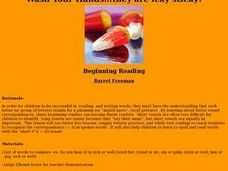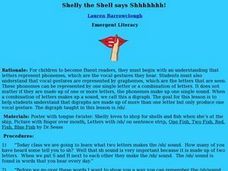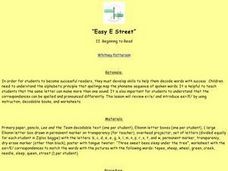Curated OER
Chirping Chickens
First graders study the /ch/ diagraph using a tongue twister which they listen to and recite. Next, they use Elkonin letterboxes to make words with the /ch/diagraph. They listen to Jean Luc-Fromental's, "Broadway Chicken" twice, the...
Curated OER
Mmmmmm Mmmmmm Yum!
Young scholars engage in an emergent literacy lesson that focuses on phonemic awareness. The importance of the letter to sound relationship is stressed in the lesson. The letter "m" is the target phoneme for students to master.
Curated OER
Buzzing Bees
First graders engage in a lesson on phonemic awareness. They practice skills that are considered essential for good reading to occur. The skills of letter recognition and corresponding the letter to its phoneme are taught.
Curated OER
Aaaa! The Baby is Crying!
Students discover the correlation between graphemes and phonemes. They distinguish phonemes in verbal word contexts and match the letters to the phonemes. They focus on working to recognize the phoneme /a/ in its oral and written form.
Curated OER
/o/... I can't stop yawning!
Students investigate the phoneme, a meaningful representation, and the letter symbol for /o/ (short o). This lesson helps students recognize the /o/ in spoken words and begin to spell words with the assistance of letter boxes. Students...
Curated OER
A Tisket-A-Tasket, Let?s Make a Flower Basket!!!
First graders practice blending words with the phonemes /i/ and /e/. Working with a specific groups of letters, 1st graders create words using the vowels i and e. they decode those words and read them repeatedly to increase fluency.
Curated OER
Ehhh! What'd ya say? Eeeggs
Students identify the vowel sound with a short e. They distinguish this sound /e/ in written and spoken words. Finally, students identify and spell using a letterbox activity and reading various words with the vowel sound and are...
Curated OER
Wash Your Hands...they are icky sticky!
Students engage in an emergent literacy instructional activity that focuses on phonemic awareness and they practice corresponding the letter "i" to its long or short sound. This type of recognition has been found to be essential to...
Curated OER
Iggy and the Icky Sticky Inchworm
Students read and spell words. They have to recognize that letters stand for phonemes and spellings map out spoken words. Long and short vowels are hard to recognize and this lesson focuses on that. The short i is taught in the...
Curated OER
Copycat, Copycat!
Students observe that sometimes the letter "c" is a copycat letter and sometimes acts like a "k" or an "s" like in the words "cat" and "race". They use Elkonin letter boxes and letters to spell words as they are called out by the...
Curated OER
Icky Sticky Goo
Students identify the letter I and the /i/ sound that it makes. They practice reading the tongue twister together, shaking their hands when they hear the /i/ sound and draw out the /i/ sound in each word. Finally, students write a...
Curated OER
The B Beat
Young scholars recognize letter b in print and respective phoneme /b/ in spoken words, such as tongue twisters. Students then listen for phoneme in spoken words, and practice writing letter b.
Curated OER
Shelly the Shell
First graders identify the digraph /sh/ in written and spoken language. Students practice the production of the /sh/ sound through word practice and stories. They identify the initial and final placement of the new digraph /sh/ using a...
Curated OER
Pretty, Pretty Queen!
Students identify and listen for the beginning sounds of words (specifically p and q). They recognize and comprehend the differences between p=/p/ and q=/kw/. Students practice writing p and q and also looking for them and listening for...
Curated OER
The Door is Creaky E
Students observe the prop of a door to demonstrate the sound of the phonemic sound of the letter "e". Then they drill and practice the sound with the teacher. The essential importance of the skill of phonemic awareness is stressed in the...
Curated OER
Quiet Please
First graders identify the digraph /sh/ in written and spoken language. After a brief discussion of the independent and combined sounds of the phonemes /s/ and /h/ students practice identifying and spelling initial and final placement of...
Curated OER
Language Arts: Understanding Phonemes
Young scholars discover the relationship between letters and phonemes. The teacher leads an oral demonstration of pronunciation and focus on the /a/ sound. Next, students examine a series of pictures, circling the ones where they hear...
Curated OER
Aaaaa is for Short /a/
Students identify and interpret the sound of the letter /a/ by looking at pictures and seeing if they can figure out what sound it makes. They practice writing the letter a, both upper and lower case on primary paper. Finally, students...
Curated OER
Icky Sticky and Itty Bitty
Students identify the letter i and the sound that it makes in various words and illustrations with the sound /i/. They practice writing the letter I both upper and lower case on paper. Finally, students circle the pictures with the...
Curated OER
Allie the Rat
Students identify the letter a and the short vowel sound it makes. They do a tongue twister with the sound in it and write what the letter a looks like on primary paper. Students have to listen to or read a story called Pat's Jam and...
Curated OER
Shhh
Students identify the digraph /sh/ in written and spoken language. Students practice the production of the /sh/ sound through storiesand tongue twisters. They identify the initial and final placement of the new digraph /sh/ using a...
Curated OER
Shiny Shoes
First graders identify the digraph /sh/ in written and spoken language. After a brief discussion of the independent and combined sounds of the phonemes /s/ and /h/ students practice identifying initial and final placement of the new...
Curated OER
"Poppy P"
Learners engage in a lesson of emerging literacy that focuses on phonemic awareness. The phoneme for the letter "p" is chosen for the lesson and students must acquire the skill of letter recognition also.
Curated OER
"Easy E Street"
Students investigate how the same letter can make more than one sound. It is also important for students to understand that the correspondences can be spelled and pronounced differently. This lesson will review e=/e/ and introduce ee=/E/...

























